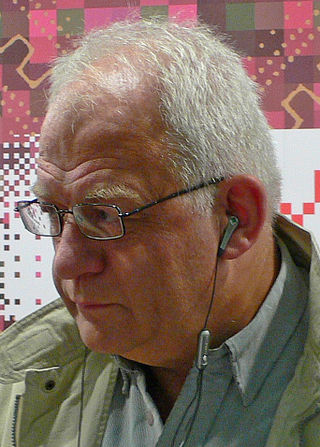
Swedish cinema is known for including many acclaimed films; during the 20th century the industry was the most prominent of Scandinavia. This is largely due to the popularity and prominence of directors Victor Sjöström and especially Ingmar Bergman; and more recently Roy Andersson, Lasse Hallström, Lukas Moodysson and Ruben Östlund.

Edvard Johannes Brost Forssell was a Swedish actor. He became recognized for his roles in the television programs Stjärnhuset and Rederiet; in Rederiet he appeared in 318 episodes. In 2013, he won a Guldbagge award for his role in the film Avalon. He also had several roles in theater.

Stefan Jarl is a Swedish film director best known for his documentaries. Together with Jan Lindqvist he made the Mods Trilogy, three films which follow a group of alienated people in Stockholm from the 1960s to the 1990s, They Call Us Misfits (1968), A Respectable Life (1979) and The Social Heritage (1993). A Respectable Life won the 1979 Guldbagge Awards for Best Film and Best Director. Jarl also wrote and directed Jag är din krigare (1997), and directed Terrorists: The Kids They Sentenced (2003), The Girl From Auschwitz (2005), and Submission (2010), a documentary about the "chemical burden" of synthetics and plastics carried by people born after World War II.

Knut Kenneth Gustafsson, known as Kenta, was a Swedish musician.

Pebbles, Volume 3, subtitled The Acid Gallery, is a compilation album featuring American underground psychedelic rock musical artists from the 1960s. It is the third installment of the Pebbles series and was released on BFD Records in 1979. The album is marked for containing among the most unusual recordings of psychedelic music.

Anton Amadé Abele is a Swedish activist, debater and politician who was Member of Parliament for Stockholm County, replacing former Minister for Culture and Sports Lena Adelsohn Liljeroth, from the 2010 general election until the 2014 general election. At the age of 18, he is the youngest person ever to become a Member of Parliament in Sweden, as well as the youngest ever member of any national legislature in the world.
Lina Maria Englund is a Swedish actress and musician.

The Last Sentence is a 2012 Swedish film, directed by Jan Troell and starring Jesper Christensen, Pernilla August, Björn Granath and Ulla Skoog. It is set between 1933 and 1945, and focuses on the life and career of Torgny Segerstedt, a Swedish newspaper editor who was a prominent critic of Hitler and the Nazis during a period when the Swedish government and monarch were intent on maintaining Sweden's neutrality and avoiding tensions with Germany. The film also deals with Segerstedt's relations with his wife, his mistress, and his mistress's husband.

Iran–Sweden relations are foreign relations between the Islamic Republic of Iran and the Kingdom of Sweden.

Wallis Grahn was a Swedish actress.
A Respectable Life is a Swedish documentary film which was released to cinemas in Sweden on 26 March 1979, directed by Stefan Jarl. The film is the second of the Mods Trilogy by Jarl. At the 15th Guldbagge Awards the film won the awards for Best Film and Best Director. It was also selected as the Swedish entry for the Best Foreign Language Film at the 52nd Academy Awards, but was not accepted as a nominee.
Embassy of Sweden in Bangkok is Sweden's diplomatic mission in Thailand. The ambassador is also accredited to Cambodia, Laos and Myanmar. Sweden also has four honorary consulates in Thailand: in Phuket, Pattaya, Chiang Mai and Hua Hin.
Lea Riders Group was a Swedish rock band with roots in Borgholm, Sweden.

Anders Erik Carlberg was a Swedish socialist politician, social worker and writer.

Fritz-Olof Thunberg was a Swedish actor, perhaps best known as the voice of the cartoon character Bamse.

Lo Marianne Kauppi is a Swedish film and theater actress, director, and television presenter. She suffered from drug addictions and an eating disorder in her early 20s but after undergoing treatment recovered and went on to forge a successful career in theater, including performances at the Royal Dramatic Theatre in Stockholm. Kauppi has also had several acting roles in Swedish films.
Kamratposten, also styled as KP, is a Swedish children's magazine published in Stockholm, Sweden. Founded in 1892, it is one of the earliest children's magazines in the country.
The Unthinkable is a 2018 Swedish thriller disaster war movie produced by Crazy Pictures, starring Christoffer Nordenrot, Lisa Henni, Jesper Barkselius and Pia Halvorsen. The film imagines a scenario in which Sweden is invaded during a rainy summer.
Oss tjuvar emellan eller En burk ananas is a Swedish comedy film from 1945 directed by Olof Molander. The film script was written by the Norwegian writer Helge Krog and the music was composed by Dag Wirén.

Johan Petri is a Swedish theatre director, dramatist, and theatre scholar. His work takes place in a field formed by authors of late modernism, contemporary poetry, postdramatic theatre, improvised and contemporary classical music.













